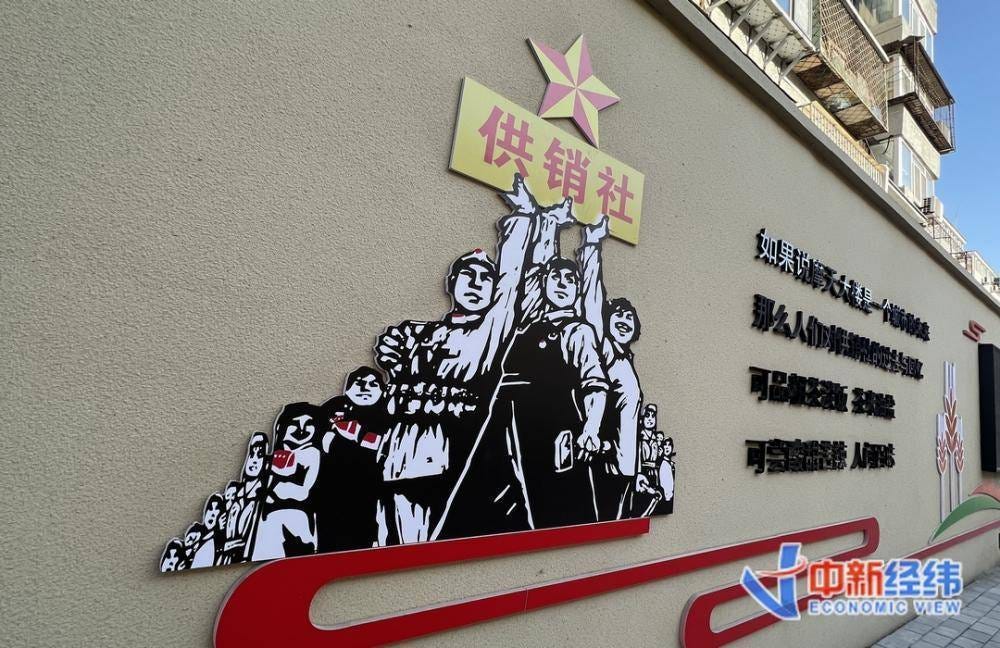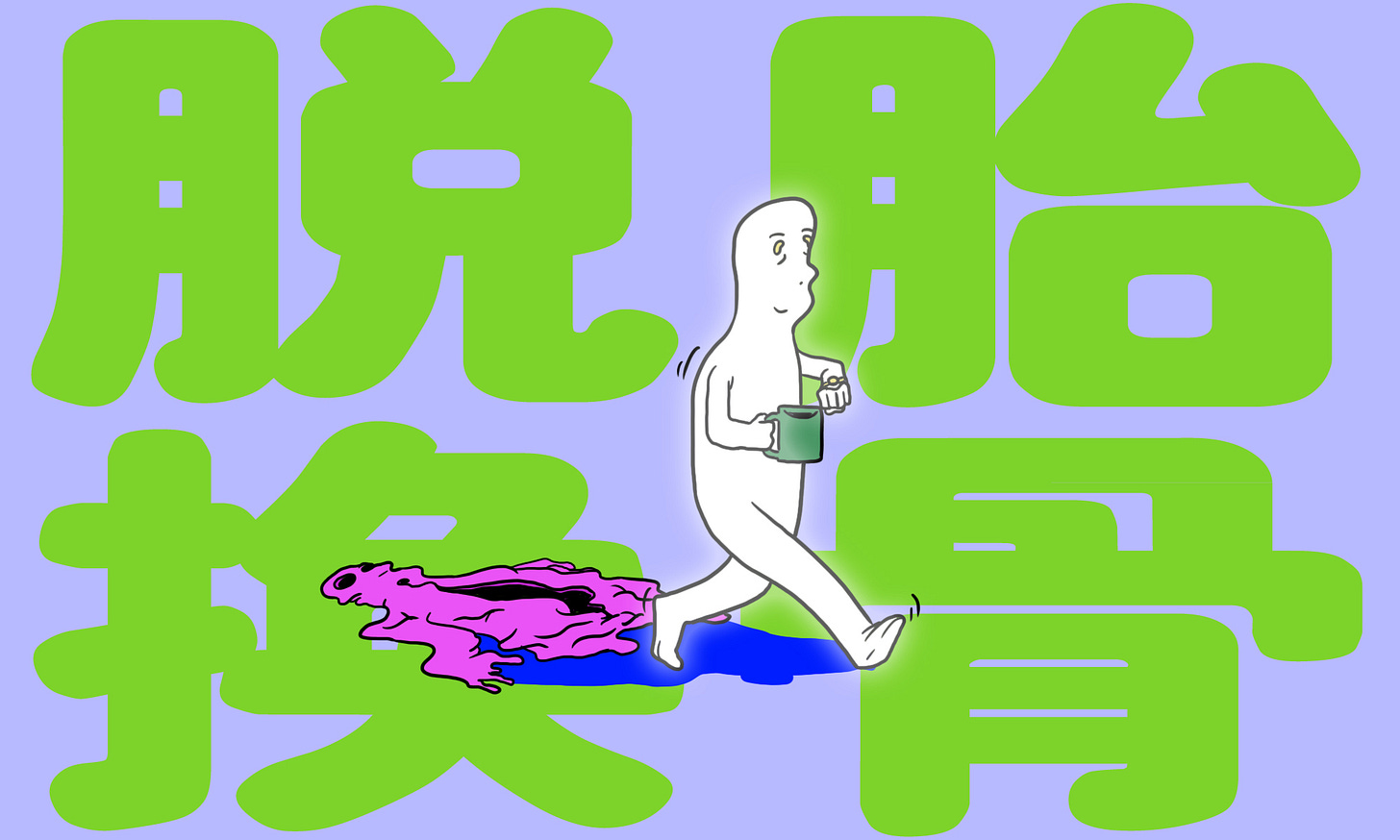Welcome to RealTime Mandarin—a multimedia resource to immerse you in the latest Chinese language trends, inspire you to practice and improve your Mandarin every week, and empower you to communicate with confidence.
Subscribe now to get the next issue straight to your inbox!
Supply and marketing cooperatives (gōng xiāo shè 供销社) have been discussed in the Chinese media following an announcement by the Hubei Daily:
‘1,373 grassroots supply and marketing cooperatives have been restored’
湖北基层供销社恢复重建至1373个,基本覆盖全省乡镇
These cooperatives were the retail storefronts of the planned economy, or 计划经济 jì huà jīng jì:
Supply and marketing cooperatives have a long history, which can be traced back to the ‘Anyuan Road Miners Consumer Cooperative’, established in July 1922. In July 1950, China established the All-China Federation of Supply and Marketting Cooperatives, marking the official establishment of the national supply and marketing cooperative system. Data shows that supply and marketing cooperatives used to supply more than 90% of goods to rural China.
供销社历史悠久,可溯源至1922年7月成立的“安源路矿工人消费合作社”。1950年7月,我国成立“中华全国合作社联合总社”,标志着全国性供销社系统正式成立。数据显示,供销社曾承担中国农村90%以上的物资供应
The All-China Federation of Supply and Marketing Cooperatives (中华全国供销合作总社) is the biggest of the co-ops. It’s a state-owned giant with over 100,000 subsidiaries, and more revenue in 2021 than Sinopec, the largest of China’s big three energy companies.
In recent years, though, cooperatives have languished due to China’s economic reforms, the rise of the private sector, and more recently the burgeoning online consumer economy.
Talk of the return of co-ops got people using one of our favourite idioms in this newsletter:
The concept of supply and marketing cooperatives is always there in China’s economy. So this is not a ‘re-emergence’ as indicated by rumors on the Internet.
供销社概念一直存在,从未离开过我国的经济体系,并非网上传言的“重出江湖”
We discussed 重出江湖 chóng chū jiāng hú, make a comeback, in 1 October newsletter.
Some internet users and media commentators saw the Hubei announcement as a signal that China was lurching backwards to a state-run era more like the 1960s.
People are afraid; afraid of the return of ‘food stamps, oil stamps, clothes stamps, meat stamps, people's communes, work points, and production teams’, and even more afraid of a return to ‘the Great Leap Forward, rectification campaigns, purges, the Socialist Education Movement, the Cultural Revolution and other movements, if the planned economy comes back.
大家内心其实是有一些恐惧的,害怕“粮票、油票、布票、肉票、人民公社、记工分、生产队”紧随而至重新回来,更害怕“大跃进、整风、肃反、四清、文革”等等各种运动也随着计划经济重新到来
The government has denied these claims, saying its about accelerating the modernization of China’s rural economy, part of its 'common prosperity' (共同富裕) drive:
After years of market reforms, the supply and marketing cooperatives of today have been reborn; they are closer to the market, more like a company, and much more dynamic.
经过了多年的市场化改革,当前的供销社已然“脱胎换股”,更贴近于市场,更接近于公司,也更具活力
So, are the sales and marketing co-ops a step back to what Kevin Rudd calls ‘Red China’, or are they something completely different?
That’s what we explore in this week’s newsletter.
But before we get stuck in, let’s brush up on some common political terms that came up a lot reading into this story:
三农 sān nóng - The Three Rural Issues of agriculture (农业), rural areas (农村) and farmers (农民)
乡村振兴 xiāng cūn zhèn xīng - Rural revitalization
统购统销 tǒng gòu tǒng xiāo - State-controlled procurement and distribution of goods
Favourite Five
1. 官老爷 guān lǎo ye
bureaucratic; big wig
更不能把自己当成官老爷,凭借半官方优势,借助行政力量,依靠垄断的方式占领市场 - The co-ops shouldn’t take advantage of their semi-official status, using administrative power and monopolistic position to dominate the market.
2. 一脸懵逼 yī liǎn mēng bī
bewildered
年轻人一脸懵逼,完全不知道这啥概念,更多的人比较狐疑,纷纷猜测,这啥意思?这啥信号?Young people had no clue about it, with many being suspicious, and guessing: What does it mean? What is the signal?
Note: this is an Internet slang phrase; 懵逼 mēng bī is originally a North Eastern dialect word which also means ‘overwhelmed’.
3. 脱胎换骨 tuō tāi huàn gǔ
totally different
经过了多年的市场化改革,当前的供销社已然“脱胎换股”,更贴近于市场,更接近于公司,也更具活力 - After years of market reforms, the supply and marketing cooperatives of today have been reborn; they are closer to the market, more like a company, and much more dynamic.
Note: There’s an interesting play on words here: the character for ‘bone’ (骨) is replaced by ‘stock’ (股) - both pronounced as ‘gǔ’. This is a pun referring to a new type of listed company - 'supply and marketing concept stocks' (供销社概念股 gōngxiāo shè gàiniàn gǔ) on China's stock markets, which themselves are radically different from the old concept of supply and marketing cooperatives
More: See The China Project Phrase of the week. Zoe also discusses in the podcast too!
4. 毛细血管 máo xì xuè guǎn
capillaries
农村供销社是基层流通的毛细血管 - Supply and marketing cooperatives are the lifeblood of grassroots supply networks.
Note: this is originally from the English medical term, capillaries. Used metaphorically in every news article I read about this story, it describes how co-ops extend to the smallest and most remote parts of rural China.
5. 不可同日而语 bù kě tóng rì ér yǔ
totally different; cannot be mentioned in the same breath
这与计划经济显然不可同日而语 - This is totally separate from the idea of the planned economy.
Note: A rare six-character idiom, first found in the Stratagems of the Warring States (战国策 zhàn guó cè). Zoe explains more about the backstory of this idiom in the podcast.
Consuming the Conversation

Useful words
抛荒 pāo huāng
deliberate discontinuation of farming on agricultural land
中国农村出现大量抛荒背景下,政府通过供销社这种模式,将农业资源重新整合 - With a large number of abandoned fields in China's rural areas, the government has pooled agricultural resources in a new way through the model of supply and marketing cooperatives.
Note: this is a relatively new word which Zoe discusses in the podcast.
撼动 hàn dòng
shake
供销社的地位几乎没有任何其他经济组织可以撼动 - There is no economic organisation that can compete with the supply and marketing cooperatives.
烙印 lào yìn
brand, mark
质疑的是供销社的历史标签,因为它有着深刻的计划经济烙印 - They worry about the negative associations of supply and marketing cooperatives of the past with the planned economy.
怀旧 huái jiù
nostalgic
供销社重新成为热词,不是大家怀旧,而是害怕回到凭票买东西的时代 - Supply and marketing cooperatives becoming a hot topic again is not about people getting nostalgic; it’s because they are concerned about returning to the past when you had to buy things with coupons.
发酵 fā jiào
ferment; brewing, forming, gathering
关于供销社相关信息的发酵,也是引发热议的原因之一 - One of the reasons for the reaction on online is that the news has been brewing for a number of days.
狐疑 hú yí
suspicious
很多人之所以心存狐疑,是出于对供销社历史的了解 - Lots of people are concerned because of their understanding of supply and marketing cooperatives in the past.
深耕 shēn gēng
deep plough; penetrating deep into something
大家希望的状态是供销社深耕资本不愿涉及的区域 - People hope that supply and marketing cooperatives can get to the places that investors’ capital is not willing to go to.
Three-character phrases
一言堂 yī yán táng
deciding everything by one person's say
班子成员内部的监督制衡作用无法发挥,导致一把手‘一言堂’现象严重 - The checks and balances within the team do not work, which leads to the leader calling all the shots.
压舱石 yā cāng shí
ballast stone; key element














